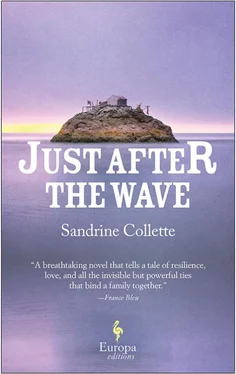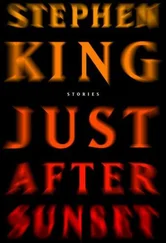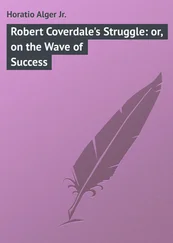And then, they wait.
But before, too: it’s a game, a challenge. Seek the shelter of the house as late as possible, don’t give in right away, not completely, like now as they are finishing their pancakes, the fine rain already wetting their legs. With the hot, damp air, they enjoy the wind on their cheeks and in their hair, for these few minutes, sometimes ten, sometimes thirty, until the storm breaks, it’s like an airlock, a time in-between, the sharp lurch of coming danger they feel deep in their gut. Right up to the last minute they stay there, backs against the wall, clothes clinging in the gusts, soaked, to savor the moment when they will go and find shelter, get changed, drink a glass of lemonade. Sometimes the house adds to the terror. Creaking, cracking, a shutter banging, a tile falling. They observe it with a curious sentiment of helplessness, as if it were some sort of giant gradually losing a finger or an eye, now with one knee to the ground—Pata has to come back before everything falls to pieces. And while they might forget their situation when the sun is blazing, forget the fear and abandonment, the storm, every time, brings them back to their terrifying reality: they are lost, all three, in the middle of the ocean.
Louie cannot help but imagine the day the house falls down. What will they have left to cling to, so that the sea does not come after them, bearing them away to a place where everything drowns, so that they won’t each become one of those floating bodies, tossed here and there by the waves—to end up sinking in some forsaken corner of the world, once the fish have eaten half their flesh? So he counts the trees still standing, their roots laid bare by the sea; he knows the salt will get the better of them. But for the time being they are still there.
“Look,” says Noah.
He points through the window to the pile of stones left at the foot of the ruined tower: the ocean is already washing against them.
“It didn’t last long.”
At the other end of the room Perrine crushes a spider with her broom.
“There are loads of them,” she grumbles.
They’re like us, thinks Louie: they’re seeking shelter. Refuge. We should leave them, this could be our own ark, there are so many animals missing but at least we have spiders.
Perrine doesn’t like spiders. She’s always afraid she’ll swallow one at night, every since Liam read that every human being consumes seven or eight spiders in a lifetime of sleeping. When he told them, the others had shuddered and cried out.
Bet it’s not even true, said Noah.
Bet I’m not even afraid, laughed Matteo—and he’d grabbed a daddy longlegs to show them, a little one, granted, the size of a coin, but it was a daddy longlegs all the same, and he swallowed it right there before them. The girls had screamed. For two or three days they kept a safe distance, convinced that at some point the spider would come back out. Out of his mouth or ears—or eyes, promised Matteo, running after them, and they scattered, shrieking in horror.
Noah watches as Perrine sweeps up the dead spider with the tip of her dust broom.
“If we end up with nothing left, do you think we’ll have to eat them?”
The days last forever, as if time were moving in slow motion. If it were winter, it would be dark at five o’clock and they would sleep half the day, but the sun is in the sky from seven in the morning to nine at night, and wakes them, gets them up, they open the shutters, the summer crushes them with heat and the storms come and go, wedged between two expanses of blue sky. Twice, five times a day, they can feel the wind coming from the south, dragging with it those big black clouds which, they know, are harbingers of the storms to which they are gradually getting accustomed. It doesn’t bother them: the variations of weather don’t interrupt anything, there is no work or play, harvests or picnics, no game of croquet—to be honest, by mid-morning they are already sighing, eager for evening so they can lie down and doze, incapable as they are of filling the absence of their parents and brothers and sisters, gone across the water. This, along with food and weather, makes up the essence of their conversations: do they believe their parents have reached the high ground, or have they been shipwrecked? Are they all dead; and are the three of them the sole survivors? What if even the high ground has been engulfed? And then always, at the end: what if Pata doesn’t come back?
They have faces grown weary with anxiety, features drawn with the fear they may have to stay there forever. The night before, Perrine murmured:
“Maybe we’ll be here until we’re old.”
Old, for them, means twenty, thirty years of age: as soon as you’re an adult, you’re old. Once you’re old, you die. There it is. Die on the island.
“Oh, no,” protested Noah. “You’re crazy.”
As if it depended on them.
To conjure fate, Louie bursts out laughing.
“What I want, when Pata comes back, is for him to take me to the car race we were supposed to go to before the storms.”
Perrine thought, then said, “What I want is a kitten.”
Noah trumpeted: “And I want an ATV!”
For a moment they smiled, the way they used to when Madie had them write their letters to Santa Claus, when they still really believed in him. To start by saying they’d been good, and provide examples to prove it: this was exasperating. Of course, Madie, Santa Claus already knows that, we don’t need to write it, he can see us, can’t he? He’s kind of like God.
Making their list, on the other hand, immersed them in frenetic excitement: they would fight over the round-ended scissors to cut out pictures from the toy catalogs so there’d be no mistakes, adding arrows and descriptive notes, using colored felt-tips and little hearts to show how those were the presents they absolutely had to have. Afterwards, they had to choose. Two presents each, said Madie, because they were far too numerous to ask Santa Claus for more, he only had two arms, after all (and a sack, ventured Louie). So they would frown at one another, they wished they were fewer in number, even though it wasn’t something you could change. At first, Liam and Matteo resorted to the argument about the sheep and the crèche, because that was the rule: every evening during Advent Madie and Pata asked them if they’d been good, or kind, or generous. They’d been allotted one sheep each, and depending on how they’d behaved that day, they had the right to move one length closer to the little terra-cotta structure where Joseph and Mary were hovering, for the moment, over nothing at all, since Jesus wasn’t born yet. But if they’d been naughty, their sheep would just stay where it was, or even move back. This was what the older boys were trying to point out: that the first sheep to reach the crèche would be entitled to an extra present. As a result, squabbles broke out, provocations, fights, cheating, too, because Madie discovered that her little ones would sneak in, when she was busy elsewhere, and move their sheep forward a few inches. In the evening, cries came thick and fast:
“But I was ahead of Louie, there, I wasn’t there!”
“My sheep has gone backwards!”
“Get out of the way, I’ll put it back.”
“You weren’t there!”
“Yes I was!”
“Cheater!”
Madie eventually raised her voice one day, and ferociously. She picked up all the sheep, despite the wailing, and put them away in a box at the very top of the cupboard.
“There,” she said. “And anyway, with all those sheep, it was looking like a racetrack, not a crèche.”
Ever since, the lists for Santa Claus were all pretty much the same, and anyway, Liam and Matteo, and then Louie, and then Perrine stopped making them. Noah stoutly maintained that he still believed, and that it was his right; everyone knew he was lying, but Madie let it go, and he would sit next to Emily and Sidonie to pick out toys from the magazines.
Читать дальше












